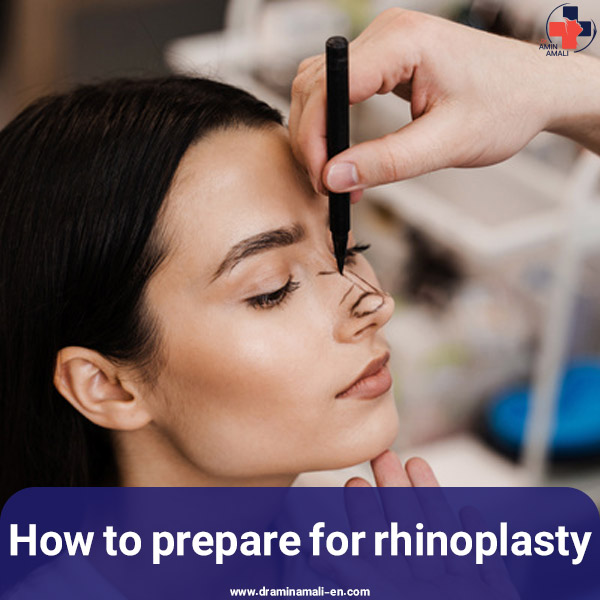If you want to achieve good results from the rhinoplasty , you need to prepare well for it. Preoperative measures for rhinoplasty include a series of care steps that prepare you physically and mentally for the procedure. When you visit your doctor before the surgery, they will provide you with detailed guidance on what to do and avoid prior to the operation.

Consultation with Rhinoplasty Surgeon
The first step in rhinoplasty preparation is to schedule a consultation with a experienced rhinoplasty surgeon who specializes in the procedure. During the consultation, the surgeon will evaluate your nose and discuss your goals for the surgery. They will also review your medical history and any medications you are taking to determine if you are a good candidate for the procedure The surgeon will also explain the procedure in detail, including the risks and benefits, and answer any questions you may have. It is important to be honest with your surgeon about your expectations and concerns to ensure that you are both on the same page.
Medical Evaluation in rhinoplasty prepration period
Before undergoing rhinoplasty, you will need to undergo a medical evaluation to ensure that you are healthy enough for surgery. This evaluation will include a physical exam, blood tests, and possibly an electrocardiogram (ECG) to evaluate your heart function. If you have any medical conditions, such as high blood pressure or diabetes, you may need to have these conditions under control before undergoing surgery. Your surgeon may also ask you to stop taking certain medications, such as blood thinners, before the procedure to reduce the risk of bleeding.
The Benefits and Importance of Strengthening the Body Before Rhinoplasty
Strengthening your body before rhinoplasty is a crucial step in preparing for this surgery. Specifically, this action can have a significant impact on the recovery process and the final outcome of the operation. Enhancing your body’s strength before surgery helps boost your immune system. A strong immune system enables your body to handle the stress of surgery more effectively. This means a lower risk of infection and faster wound healing. Therefore, by consuming healthy, vitamin-rich foods, you can help your body become more prepared.
Another important aspect of strengthening the body before rhinoplasty is that it promotes better blood circulation. This is particularly significant because good circulation ensures that more oxygen and nutrients are delivered to the surgical site. As a result, effective oxygenation helps damaged tissues repair and regenerate more quickly, leading to less swelling and bruising.
By preparing your body, you also experience less stress before surgery. Stress can slow down the recovery process and even increase the risk of complications. Practicing relaxation techniques like yoga or meditation can help reduce stress and prepare both your mind and body for the surgery.
One more benefit of strengthening your body before rhinoplasty is that it provides you with more energy. This additional energy is essential during the recovery period after the surgery. When your body is strong, you can better cope with post-operative challenges such as pain or discomfort and return to your normal life more quickly.
Remember, strengthening your body before rhinoplasty is a gradual process and should ideally begin several weeks prior to the surgery. Always consult with your doctor and follow their guidance to achieve the best results from your rhinoplasty procedure.
Avoid Smoking and Alcohol in rhinoplasty preparation
Smoking and alcohol can have a negative impact on the healing process after surgery. Smoking can increase the risk of complications, such as infection and poor wound healing, while alcohol can interfere with anesthesia and increase bleeding. It is important to stop smoking and drinking alcohol at least two weeks before the surgery and avoid them for several weeks after the procedure. Your surgeon may also recommend that you avoid secondhand smoke and limit your exposure to environmental toxins, such as air pollution.
Preparing for the Procedure
In the weeks leading up to the surgery, it is important to take care of yourself to ensure that you are in the best possible condition for the procedure. This includes getting enough rest, eating a healthy diet, and staying hydrated. You should also avoid strenuous exercise and activities that could cause injury to your nose, such as contact sports. Your surgeon may also recommend that you avoid certain foods and supplements, such as garlic and vitamin E, which can increase the risk of bleeding in your rhinoplasty prepration period.
Preparing for Recovery
After the surgery, you will need to take time off from work and other activities to allow your nose to heal properly. It is important to prepare for this recovery period by arranging for someone to help you with daily tasks, such as cooking and cleaning, and by stocking up on supplies, such as pain medication and ice packs. You should also plan to rest and avoid strenuous activities for several weeks after the surgery. Your surgeon will provide you with specific instructions for caring for your nose during the recovery period, including how to clean and dress the incision site.
What Medications Should Be Avoided Before Rhinoplasty?
In general, any medication that thins the blood or increases the risk of bleeding should be discontinued at least two weeks before rhinoplasty. Some common medications to avoid include:
- Non-Steroidal Anti-Inflammatory Drugs (NSAIDs): Such as aspirin, ibuprofen, naproxen, and mefenamic acid.
- Blood Thinners: Such as warfarin, heparin, and clopidogrel.
- Herbal Supplements: Such as garlic, ginger, ginseng, and ginkgo biloba.
- Vitamins: Vitamin E and Vitamin C.
- Oral Contraceptives: These should be discontinued one month before surgery in consultation with your doctor.
Tips Regarding Medication Use Before Rhinoplasty:
- Provide your doctor with a complete list of all medications you are taking, including prescription and over-the-counter drugs.
- Do not stop or start any medication without consulting your doctor.
- If you have any questions or concerns about a specific medication, ask your doctor for advice.
What to eat in rhinoplasty preparation ?
Before any surgical procedure, it’s important to follow your doctor’s instructions regarding food and drink. In general, you may be advised to avoid eating or drinking anything for a certain period of time before your rhinoplasty procedure. This is because anesthesia is typically used during the surgery, and having food or drink in your stomach can increase the risk of complications. Your doctor may also recommend that you avoid certain foods and drinks in the days leading up to your surgery.
For example, you may be advised to avoid alcohol, caffeine, and foods that are high in sodium or sugar. Eating a healthy, balanced diet in the days leading up to your surgery can help ensure that your body is in the best possible condition for the procedure. It’s important to follow your doctor’s instructions closely in rhinoplasty preparation part to ensure the best possible outcome from your rhinoplasty procedure. If you have any questions or concerns about what to eat before your surgery, be sure to discuss them with your doctor.
What tests should we do before rhinoplasty ?
Before undergoing rhinoplasty, there are several tests that may be recommended by your surgeon to ensure that you are a good candidate for the procedure and to help plan the surgery. These tests may include :
- Physical examination : Your surgeon will examine your nose and facial features to evaluate the size, shape, and symmetry of your nose, as well as the quality of your skin.
- Medical history : Your surgeon will review your medical history, including any previous surgeries, allergies, medications, and medical conditions that may affect the surgery or your recovery in rhinoplasty prepration period.
- Imaging tests : Your surgeon may order imaging tests such as X-rays, CT scans, or MRI scans to evaluate the internal structures of your nose and to help plan the surgery.
- Blood tests : Your surgeon may order blood tests to evaluate your overall health and to check for any underlying medical conditions that may affect the surgery or your recovery.
- Allergy testing : Your surgeon may recommend allergy testing to identify any allergies that may affect the surgery or your recovery.
It’s important to discuss any concerns or questions you may have with your surgeon before undergoing rhinoplasty.
What is necessary to buy in rhinoplasty preparation ?
Before undergoing rhinoplasty, it’s important to follow your surgeon’s specific instructions regarding pre-operative preparation. However, some general items you may want to consider purchasing before your surgery include :
- Medications : Your surgeon may prescribe pain medication or antibiotics to take before and after your surgery. Make sure to fill these prescriptions ahead of time.
- Cold compresses : Cold compresses can help reduce swelling and bruising after surgery. You may want to purchase a few gel packs or ice packs to have on hand.
- Soft foods : You may experience some discomfort or difficulty chewing after surgery, so it’s a good idea to stock up on soft foods like yogurt, soup, and pudding.
- Comfortable clothing : You’ll want to wear loose, comfortable clothing on the day of your surgery. Avoid tight-fitting tops that could rub against your nose.
- Entertainment : You may be resting and recovering for several days after your surgery, so it’s a good idea to have some books, movies, or other forms of entertainment on hand during rhinoplasty preparation to keep you occupied while you are recovering your body.
Remember to consult with your surgeon for specific instructions and recommendations before your rhinoplasty procedure.
Conclusion
Preparing for rhinoplasty is an important part of ensuring a successful outcome. By consulting with a plastic surgeon, undergoing a medical evaluation, and taking care of yourself in the weeks leading up to the surgery, you can minimize the risks and maximize the benefits of the procedure. With proper rhinoplasty preparation and care, rhinoplasty can improve the appearance of your nose and enhance your overall quality of life.












